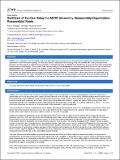Synthesis of zeolites using the ADOR (Assembly-Disassembly-Organization-Reassembly) route
View/
Date
03/04/2016Grant ID
EP/K005499/1
EP/K025112/1
EP/L014475/1
Metadata
Show full item recordAbstract
Zeolites are an important class of materials that have wide ranging applications such as heterogeneous catalysts and adsorbents which are dependent on their framework topology. For new applications or improvements to existing ones, new zeolites with novel pore systems are desirable. We demonstrate a method for the synthesis of novel zeolites using the ADOR route. ADOR is an acronym for Assembly, Disassembly, Organization and Reassembly. This synthetic route takes advantage of the assembly of a relatively poorly stable zeolite which can be selectively disassembled into a layered material. The resulting layered intermediate can then be organized in different manners by careful chemical manipulation and then reassembled into zeolites with new topologies. By carefully controlling the organization step of the synthetic pathway, new zeolites with never before seen topologies are capable of being synthesized. The structures of these new zeolites are confirmed using powder X-ray diffraction and further characterized by nitrogen adsorption and scanning electron microscopy. This new synthetic pathway for zeolites demonstrates its capability to produce novel frameworks that have never been prepared by traditional zeolite synthesis techniques.
Citation
Wheatley , P S , Čejka , J & Morris , R E 2016 , ' Synthesis of zeolites using the ADOR (Assembly-Disassembly-Organization-Reassembly) route ' , Journal of Visualized Experiments , no. 110 , e53463 . https://doi.org/10.3791/53463
Publication
Journal of Visualized Experiments
Status
Peer reviewed
Type
Journal article
Description
R.E.M. thanks the Royal Society and the E.P.S.R.C. (Grants EP/L014475/1, EP/K025112/1 and EP/K005499/1) for funding work in this area. J.Č. acknowledges the Czech Science Foundation for the project of the Centre of Excellence (P106/12/G015) and the European Union Seventh Framework Programme (FP7/ 2007-‐‐2013) under grant agreement n°604307.Collections
Items in the St Andrews Research Repository are protected by copyright, with all rights reserved, unless otherwise indicated.

